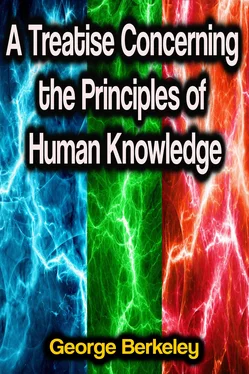17 It were an endless as well as an useless thing to trace the Schoolmen, those great masters of abstraction, through all the manifold inextricable labyrinths of error and dispute which their doctrine of abstract natures and notions seems to have led them into. What bickerings and controversies, and what a learned dust have been raised about those matters, and what mighty advantage has been from thence derived to mankind, are things at this day too clearly known to need being insisted on. And it had been well if the ill effects of that doctrine were confined to those only who make the most avowed profession of it. When men consider the great pains, industry, and parts that have for so many ages been laid out on the cultivation and advancement of the sciences, and that notwithstanding all this the far greater part of them remains full of darkness and uncertainty, and disputes that are like never to have an end, and even those that are thought to be supported by the most clear and cogent demonstrations contain in them paradoxes which are perfectly irreconcilable to the understandings of men, and that, taking all together, a very small portion of them does supply any real benefit to mankind, otherwise than by being an innocent diversion and amusement- I say the consideration of all this is apt to throw them into a despondency and perfect contempt of all study. But this may perhaps cease upon a view of the false principles that have obtained in the world, amongst all which there is none, methinks, hath a more wide and extended sway over the thoughts of speculative men than this of abstract general ideas.
18 I come now to consider the source of this prevailing notion, and that seems to me to be language. And surely nothing of less extent than reason itself could have been the source of an opinion so universally received. The truth of this appears as from other reasons so also from the plain confession of the ablest patrons of abstract ideas, who acknowledge that they are made in order to naming; from which it is a clear consequence that if there had been no such things as speech or universal signs there never had been any thought of abstraction. See III. vi. 39, and elsewhere of the Essay on Human Understanding. Let us examine the manner wherein words have contributed to the origin of that mistake.- First then, it is thought that every name has, or ought to have, one only precise and settled signification, which inclines men to think there are certain abstract, determinate ideas that constitute the true and only immediate signification of each general name; and that it is by the mediation of these abstract ideas that a general name comes to signify any particular thing. Whereas, in truth, there is no such thing as one precise and definite signification annexed to any general name, they all signifying indifferently a great number of particular ideas. All which doth evidently follow from what has been already said, and will clearly appear to anyone by a little reflexion. To this it will be objected that every name that has a definition is thereby restrained to one certain signification. For example, a triangle is defined to be "a plain surface comprehended by three right lines,"
by which that name is limited to denote one certain idea and no other. To which I answer, that in the definition it is not said whether the surface be great or small, black or white, nor whether the sides are long or short, equal or unequal, nor with what angles they are inclined to each other; in all which there may be great variety, and consequently there is no one settled idea which limits the signification of the word triangle. It is one thing for to keep a name constantly to the same definition, and another to make it stand everywhere for the same idea; the one is necessary, the other useless and impracticable.
19 But, to give a farther account how words came to produce the doctrine of abstract ideas, it must be observed that it is a received opinion that language has no other end but the communicating our ideas, and that every significant name stands for an idea. This being so, and it being withal certain that names which yet are not thought altogether insignificant do not always mark out particular conceivable ideas, it is straightway concluded that they stand for abstract notions. That there are many names in use amongst speculative men which do not always suggest to others determinate, particular ideas, or in truth anything at all, is what nobody will deny. And a little attention will discover that it is not necessary (even in the strictest reasonings) significant names which stand for ideas should, every time they are used, excite in the understanding the ideas they are made to stand for- in reading and discoursing, names being for the most part used as letters are in Algebra, in which, though a particular quantity be marked by each letter, yet to proceed right it is not requisite that in every step each letter suggest to your thoughts that particular quantity it was appointed to stand for.
20 Besides, the communicating of ideas marked by words is not the chief and only end of language, as is commonly supposed. There are other ends, as the raising of some passion, the exciting to or deterring from an action, the putting the mind in some particular disposition- to which the former is in many cases barely subservient, and sometimes entirely omitted, when these can be obtained without it, as I think does not unfrequently happen in the familiar use of language. I entreat the reader to reflect with himself, and see if it doth not often happen, either in hearing or reading a discourse, that the passions of fear, love, hatred, admiration, disdain, and the like, arise immediately in his mind upon the perception of certain words, without any ideas coming between. At first, indeed, the words might have occasioned ideas that were fitting to produce those emotions; but, if I mistake not, it will be found that, when language is once grown familiar, the hearing of the sounds or sight of the characters is oft immediately attended with those passions which at first were wont to be produced by the intervention of ideas that are now quite omitted. May we not, for example, be affected with the promise of a good thing, though we have not an idea of what it is? Or is not the being threatened with danger sufficient to excite a dread, though we think not of any particular evil likely to befal us, nor yet frame to ourselves an idea of danger in abstract? If any one shall join ever so little reflexion of his own to what has been said, I believe that it will evidently appear to him that general names are often used in the propriety of language without the speaker's designing them for marks of ideas in his own, which he would have them raise in the mind of the hearer. Even proper names themselves do not seem always spoken with a design to bring into our view the ideas of those individuals that are supposed to be marked by them. For example, when a schoolman tells me "Aristotle hath said it," all I conceive he means by it is to dispose me to embrace his opinion with the deference and submission which custom has annexed to that name. And this effect is often so instantly produced in the minds of those who are accustomed to resign their judgment to authority of that philosopher, as it is impossible any idea either of his person, writings, or reputation should go before. Innumerable examples of this kind may be given, but why should I insist on those things which every one's experience will, I doubt not, plentifully suggest unto him?
21 We have, I think, shewn the impossibility of Abstract Ideas. We have considered what has been said for them by their ablest patrons; and endeavored to show they are of no use for those ends to which they are thought necessary. And lastly, we have traced them to the source from whence they flow, which appears evidently to be language.- It cannot be denied that words are of excellent use, in that by their means all that stock of knowledge which has been purchased by the joint labours of inquisitive men in all ages and nations may be drawn into the view and made the possession of one single person. But at the same time it must be owned that most parts of knowledge have been strangely perplexed and darkened by the abuse of words, and general ways of speech wherein they are delivered. Since therefore words are so apt to impose on the understanding, whatever ideas I consider, I shall endeavour to take them bare and naked into my view, keeping out of my thoughts so far as I am able, those names which long and constant use hath so strictly united with them; from which I may expect to derive the following advantages:
Читать дальше












